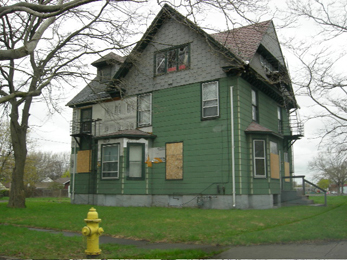By Kenny Tompkins;
Niagara Falls City Councilman
One area that continues to be a problem in Niagara Falls is our code enforcement of derelict properties in our city. These properties pose a safety hazard for residents, decreases property values, and make our city unappealing.
Last summer, I rode around with code enforcement inspectors to see what they do. I believe the inspectors are dedicated individuals with the best of intentions when it comes to cleaning up our city and enforcing the rules on the books. However, the process doesn’t fully support their efforts.
Our system is designed to handle code violations as follows:
- A complaint is lodged by someone with the city that a property appears to be neglected and in possible violation of the housing code..
- An inspector evaluates property and documents any violations.
- The property owner is sent a letter advising the he or she has 30 days to make the necessary repairs.
- After the 30 days is complete, the code enforcement inspector returns to confirm whether repairs have been satisfactorily made.
- If the repairs have not been made, the property owner is sent a second warning and is given an additional 30 days to complete repairs
- If after 60 days the repairs have not been made, the inspectors complete court paperwork and file it with the city’s legal department, who in turn files the complaint in city court.
- The court sets an arraignment date.
- A pre-trial meeting is held in an attempt to resolve the dispute.
- If no resolution is agreed upon at the pre-trial meeting, the issue goes to trial. The reality is that oftentimes, these issues go unresolved for months or even years. The properties continue to deteriorate. People become discouraged living in this city and those with the resources relocate. This impacts our ability to attract buyers and others who want to invest in this city.
The questions I want to investigate this year are:
- Why must a complaint be lodged first? Can we have teams drive around town and identify properties that are visibly in violation?
- While by law, homeowners are permitted 30 days to complete repairs, can this process be sped along by asking for a response within 15 days, and a second letter sent in 15 days if no acknowledgement has been made?
- Is it possible to expedite failure-to-comply cases through the legal department and court system? I would like to see cases ready to go to trial by the date they are filed versus what often happens now which is continual delays.
I understand that there are issues that create this backlog. One is absentee or out-of-town landlords. In this case, there should be a requirement that the property owner appoint a local proxy to address these issues promptly. If they fail to have a contact person in the city (or don’t respond themselves), a fine could be levied to get their attention.
Consistent enforcement is necessary as well. Niagara Falls is a small city and everyone is somehow inter-connected. Making exceptions to rules for friends and family is part of the reason this issue has grown so fast. We need to hold all homeowners and property owners accountable for maintaining their properties.
This is also a city where many individuals are living at or below the poverty level and are on fixed incomes. I propose to identify opportunities to help people by coordinating with the Isaiah 61 program. Under supervision, the individuals training with Isaiah 61 could do some of the repair work needed. This would provide a community service and offset the amount of money the city has already invested in this program.
While there are many challenges this city faces, code enforcement is one for which we already have the money budgeted and laws on the books. I have discussed this matter at length with City Administrator Nick Melson. If we can streamline the process and give the code enforcement team teeth, while providing ample, genuine support to those in need, we might see dramatic improvement in our neighborhoods. This upturn could help attract new homeowners and create the type of city we all desire.
